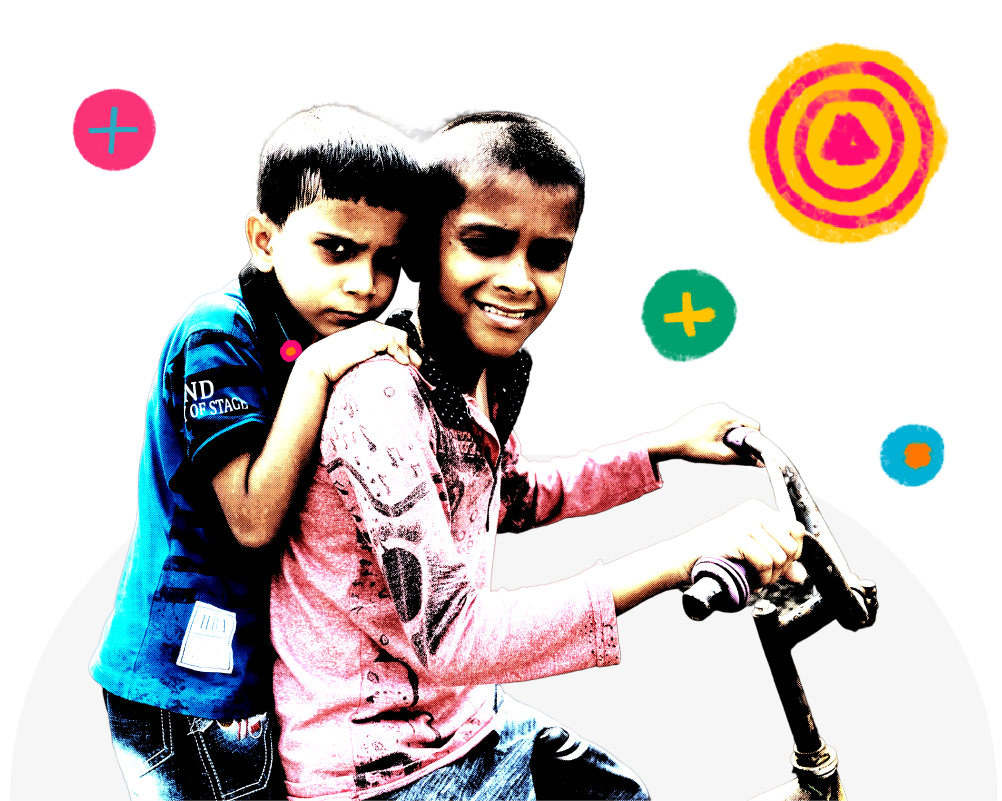
The Problem
India’s ed crisis
We are facing a crisis of unprecedented proportions- a reflection of our unjust system that dictates the fate of children based on their socio-economic circumstances. A system that excludes children from education and perpetuates practices that shrink their limitless potential. The state of education before the pandemic struck was worrying enough and now things have just gotten worse.


The reality of inequity
Hunger Index
India ranked 94 among 107 countries in the Global Hunger Index (GHI) 2020 and continues to be in the “serious” hunger category.
Oxfam Inequality Index
India fared poorly, ranking 147 out of 157 countries, in terms of its commitment to reducing inequality, while Denmark topped the list.
Water quality index
Globally, India is ranked 120 out of 122 countries in WaterAid’s water quality index.
Air Quality Index
While India is at the bottom of the list in the environmental health category, it ranks 177 out of 180 as far as air quality is concerned.
UN World Happiness Index
India is at 139 out of 156 countries.
World Press Freedom Index
India ranks at 142 out of 180 countries.
Environment Quality Index
India secured the 168th rank in the 12th edition of the biennial Environment Performance Index (EPI Index 2020).
Future Index
India ranks 35th on the worldwide education for the future index.
The Grey Sunshine of the Education System

Over the past decade, India has made significant progress in the area of education:
- Access to primary and secondary school has improved dramatically
- A growing literacy rate
- Education as a fundamental right, with the RTE Act of 2009
- A national dialogue on the need for education, motivated by parental demands and global competitive standards
- Multiple stakeholders- private and public- working for sustainable, nationwide change.
The Challenge
The Challenge
Accelerated learning gap
Low-income children have suffered tremendous learning loss in the past year. The truth is that today, we are failing the majority of our children, and in turn an entire generation that can take our nation to greatness. The fact is that teachers alone cannot solve this crisis; we also need excellent school principals to support those teachers, informed parents to stay engaged with the teaching-learning process in schools, visionary bureaucrats and politicians to create an environment that enables principals and teachers to thrive, active civil society leaders to hold stakeholders accountable, and committed corporate leaders to mobilise the necessary resources to support school systems.


The Solution
What the Indian Education System Urgently needs?
Access to early childhood care and education
With a significant percentage (9.7%) of India’s population below 5 years of age, there is a massive need for a policy framework that supports Early Childhood Care and Education (ECCE). However, the reality is far from the vision of integrated ECCE that is needed to give all children a sound foundation for lifelong learning & development. Teach For India Alumni in organizations like Hippocampus, Thermax Foundation, Wunderbar, Samit Shala, Pune Children’s Zone and Pratham are working on different aspects of this issue.
Development of teachers and school principals
Building capability in teachers has been a major challenge with pre-service and in-service teacher training falling short of equipping our teachers with the skills and mindsets required to succeed in a diverse range of classroom and school contexts. In addition, the country faces a shortage of over 9 lakh teachers and qualified headteachers who can lead a school. In addressing this multifaceted challenge, Teach For India Alumni are engaged in helping teachers improve their effectiveness. Through organizations like iTeach, Leadership Institute for Teachers, TalentSprint, STIR, Firki and India School Leadership Institute, our Alumni are showing what is possible when we look at teachers as key partners in education reform.
Design of curriculum and assessments
The National Curriculum Framework (NCF) results in curricular policies and practices that, as noted by a SCERT- led review, are “not suitable for children from all sections of society”, “not local specific”, and “not related to day-to-day life” of the students and teachers. Indian curriculum has also been shown to be “overambitious” - content not suited to the pace of children’s learning.
Similarly, this has been the case with the reform movement in the space of assessments with the Continuous and Comprehensive Evaluation (CCE) system. Combine this with the lack of a uniform national large-scale student assessment programme and one encounters a challenging scenario where there is very little objective information on student learning outcomes for decision-making at the school or policy level.
With the journey of curriculum and assessments beginning as soon as one enters the classroom, we see many Fellows continuing to work as Alumni in creating contextualized curriculum, assessments and frameworks, for different modes of delivery, and in training teachers and schools in performing assessment-related tasks, in organisations such as Educational Initiatives, iDiscoveri, Gray Matters, Leadership Boulevard, and Bridge International Academies.
Community empowerment
In a system that is as massive as ours, the mode of fixing accountability from the top creates extreme challenges. In such a scenario, empowering communities at a school-level for governance is critical to the success of the movement towards quality. Through this, the school becomes the reflection of its community, with its local set of priorities, values and needs.
To this effect, Section 21 of the RTE Act (2009) mandates the formation of School Management Committees (SMCs) in all government-run or aided schools. With an eye on equitable decision-making, parents or guardians are supposed to make up 75% of the committee, with proportional representation for disadvantaged groups and 50% representation by women. However, high incidence of illiteracy, lack of awareness of rights, roles and responsibilities, and prevailing power structures often interfere with the proper functioning of SMCs.
Teach For India Fellows as well as Alumni in organizations like Saajha, AfterTaste, Akanksha and Indus Action are solving various adaptive challenges related to community empowerment and harmonizing the power of the collective by rallying and organizing parents and other community members around school transformation.
Integration of technology in education
With the spread of the digital revolution and increased globalization, education systems across the world are being subjected to a variety of forces that are pushing and pulling at it. COVID-19 brought alive the class difference and deepened the digital divide.
With content being tailored to individual needs and with the ability to provide instant feedback to both students and teachers, technology has the potential to let each child learn at their own pace. Teach For India Alumni are working tirelessly to integrate technology into India’s classrooms through roles in education-technology organizations like EkStep, Meghshala, Central Square Foundation, Nalanda, and Zaya, to name just a few.
Our Model
In order to build a growing community of leaders, Teach For India has developed a two-part theory of change. At Teach For India, we believe that at the root of this crisis in education lies a crisis of leadership. We exist in order to fix that deficit.
.The Fellowship
In the short-term, through our Fellowship program, we provide an opportunity to India’s brightest and most promising individuals, from the nation’s best universities and workplaces, to serve as full-time teachers to children from low-income communities in some of the nation’s most under-resourced schools.
Through this experience of teaching in classrooms and working with key education stakeholders like students, principals, and parents, our Fellows get exposed to the grassroots realities of India’s education system and begin to cultivate the knowledge, skills, and mindsets necessary to attain positions of leadership in the education system and identify their role in building a larger movement for equity in education.
In the past decade, more than 120,000 people have applied to the Teach For India Fellowship.
Our selectivity ranges from 6.00-8.36% competing with leading universities.
The Alumni Movement
In the long-term, we engage these leaders, our Alumni, and support this growing community to advocate for change. Our Alumni work in diverse roles within the education sector, as teachers, teacher-trainers, school principals, curriculum designers, and education policy researchers, as well as in the ecosystem surrounding and supporting the education sector, as journalists, lawyers, health experts, entrepreneurs, and corporate leaders.
All of them share a purpose- to build a broad people’s movement for educational equity that will accelerate progress towards that day when all children in India have the opportunity to attain an excellent education so that we, as a nation, can find our light and true potential.
Where we work
Our network spans 8 cities in India. Ahmedabad, Bengaluru, Chennai, New Delhi, Hyderabad, Kolkata, Mumbai and Pune.
Our Alumni and Fellows liaise with multiple stakeholders in rural and urban communities across India in order to create tangible change for India’s children.
Since 2009, we have built the largest pipeline of skilled and driven talent in the Indian educational ecosystem.


Our People
Our People
Our movement is fuelled by collective leadership at all levels
We consider our people to be our best assets. The team comes from all sectors, fields of expertise, industries and walks of life. There's just one thing that connects them all - they have children at the core of everything they do. Meet our leadership team that strives relentlessly for an India free of poverty and filled with love.


Our Values
Our Values
Our work is deeply rooted in the 8Cs
Teach For India believes that through the work we do, we must reflect the values we believe in. The 8cs work as guiding principles for our mission. They help our people grow and evolve into caring, responsible adults in service of children.

Teach For India is a part of the Teach For All Network, a growing group of independent organizations that are working to expand educational opportunity in their nations. Teach For All is a platform for shared learning and deep engagement across countries. The 61 countries in the network today share a common vision that one day all children will attain an excellent education.